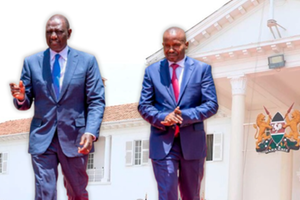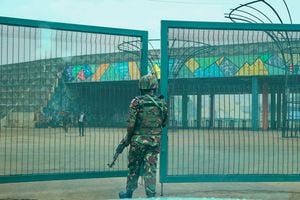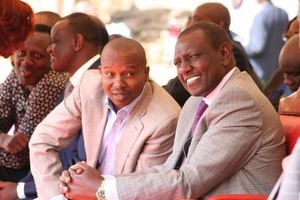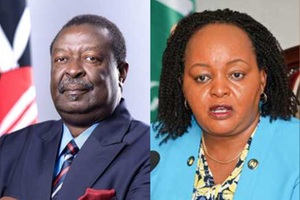Breaking News: Former Lugari MP Cyrus Jirongo dies in a road crash
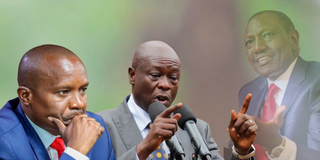
The High Court's orders preventing CS Kithure Kindiki's swearing-in following Rigathi Gachagua's impeachment have led to divided legal opinions.
The court orders stopping the swearing-in of Kithure Kindiki as the country’s new Deputy President after Rigathi Gachagua was impeached by Parliament has divided legal minds and caused confusion on the position of the President’s principal assistant.
The Senate upheld the impeachment of Mr Gachagua on Thursday, October 17. On Friday, the National Assembly received the nomination of and voted in Prof Kindiki as the designated Deputy President.
The Speaker of the National Assembly then gazetted Prof Kindiki as the Deputy President-designate pending his swearing-in.
However, the courts have slammed the brakes on Prof Kindiki from assuming office pending the determination of a case lodged by Mr Gachagua.
Sources within Prof Kindiki’s circles indicate that no swearing-in will take place until a decision is made by the courts.
Lawyers are split on where Kenya stands. Some think the country doesn’t have a deputy president, others think Mr Gachagua is still the office holder while others even believe that Prof Kindiki and Mr Gachagua can both claim that position legally.
The impeachment saga is surrounded by more than 20 court cases, but the latest debate is on two orders issued on Friday, October 18 by the High Court in Nairobi and in Kerugoya.
Lawyers interviewed by Nation.Africa who said Mr Gachagua remains the deputy president are Bobby Mkangi, Charles Kanjama and Moses Mabeya.
Lawyer Kibe Mungai, on the other hand, believes Kenya does not have a deputy president at the moment.
Mr Mkangi, a constitutional lawyer who was part of the Committee of Experts that delivered the 2010 Constitution, told Nation.Africa that constitutionally, Mr Gachagua remains the Deputy President of Kenya until the courts says otherwise.
Mr Mkangi says there is nothing that has been overtaken by events as argued by some lawyers, saying the courts have the jurisdiction to right a wrong if a person feels the process was not according to the law.
“We are just in a political quagmire but constitutionally, things are flowing normally. Mr Gachagua remains the constitutional holder of the office of the Deputy President,” Mr Mkangi said.
He added: “You cannot say that since something has happened, there is no room for redress, courts exist to check whether the events were done according to the law. So there is nothing that has been overtaken by events.”
According to Mr Mkangi, the swearing-in of Prof Kindiki cannot proceed because it has to be presided over by the Chief Justice who heads the institution that has given the court orders.
“Who is going to swear him in? It has to be the Chief Justice, and there is no way she can go against an active order against an institution she heads,” Mr Mkangi said. The only option in the situation would be to get another court order.
According to Mr Kanjama, the conservatory order that came from Justice Chacha Mwita in Nairobi pauses everything in the succession bid until the matter is considered on October 24.
“It has undone the effects of the impeachment resolution of the Senate, pending a court hearing. It has in effect reinstated Mr Gachagua as Deputy President,” Mr Kanjama told Nation.Africa
Speaking on NTV on Friday evening, he emphasised why a conservatory order is supreme.
“Conservatory order is the most powerful kind of constitutional order. It is like a four-dimensional court order. It is more powerful than an injunction; it is more powerful than an order of stay,” he said.
He added: “It applies in time — stopping what has happened in the past, preventing something to go on in the future, and even impacting the present. So, when you look at the exact wording of the court orders that (were) issued both in Nairobi and in Kerugoya, there are conservatory orders stopping implementation of the impeachment resolution of the Senate. What this means is that it doesn’t matter how much implementation had already taken place by the time the order was issued. Any further implementation is stopped by the court order,” he said.
Mr Mabeya, a young lawyer who joined the bar two years ago, also noted that the conservatory order means Mr Gachagua is the office-holder.
“My opinion is that the conservatory orders stay implementation of a decision of impeachment. Impeachment strips the DP of that position. If that very act is stopped, then what remains is that the DP still enjoys the powers of that office and remains the office holder,” he told the Nation.Africa.
Constitutional lawyer Kibe Mungai, reading the events differently, told Nation.Africa that Kenya “doesn’t have” a DP at the moment.
“But the Constitution lays down the line of succession and effect of any vacancy,” he said.
What complicates the situation is that by the time Justice Mwita’s order came out, Parliament had already approved Prof Kindiki’s nomination, and this was swiftly gazetted by Mr Moses Wetang’ula, the Speaker of the National Assembly.
This is what led some legal minds to interpret that the court order had been overtaken by events. They included Kisumu Senator Tom Ojienda.
“The order is overtaken by events coming after the proper nomination and appointment of Prof Kithure Kindiki,” Prof Ojienda wrote on his social media site X account.
It also does not help matters that a couple of gazette notices were issued, which were shared by lawyer Ahmednasir Abdullahi on social media when he posted: “They throw in a court order...WE reply with a Gazette notice.”
On Friday afternoon, former Law Society of Kenya president Nelson Havi posted on social media that Kenya had “two deputies”. By evening, he had taken the position that the conservatory orders have to be obeyed, disagreeing with Prof Ojienda.
“The court order must be obeyed. It is not a suggestion. That is what every truthful advocate including those of us who support President William Ruto must tell him and the People of Kenya. Do not mislead anyone, Prof [Ojienda],” he wrote.


